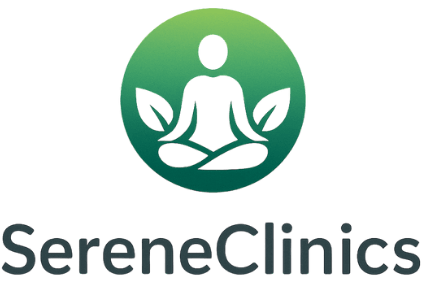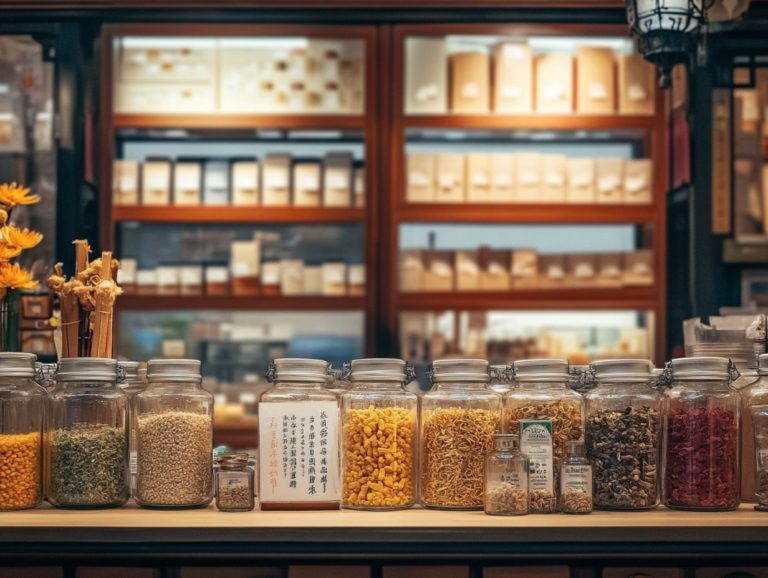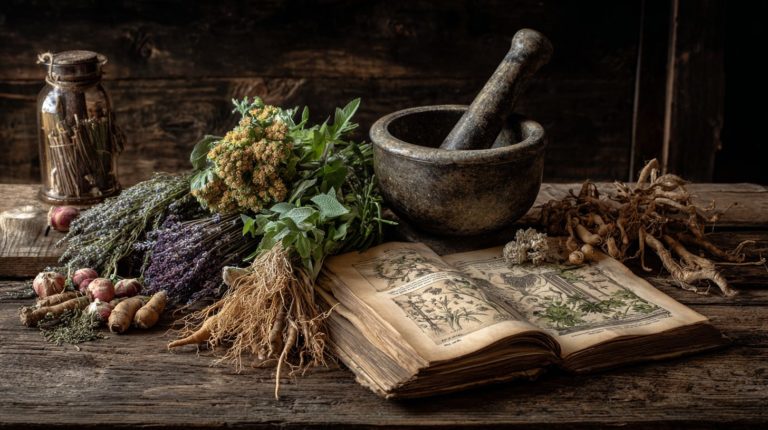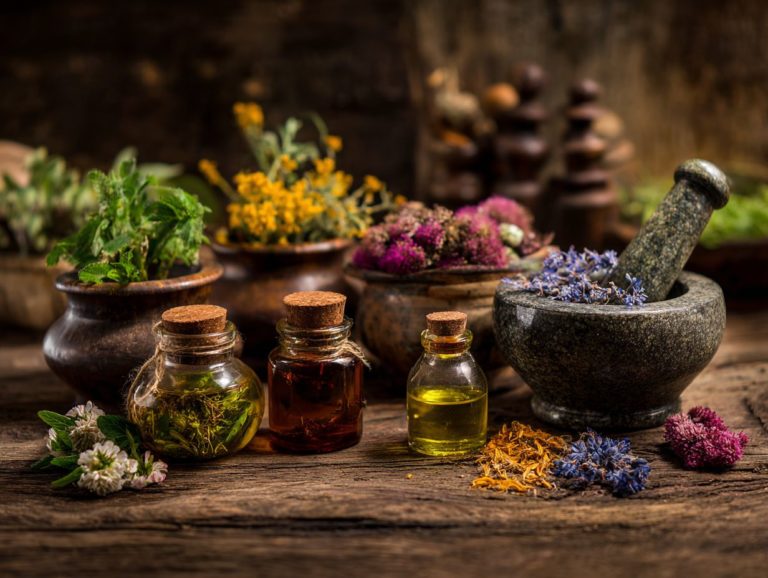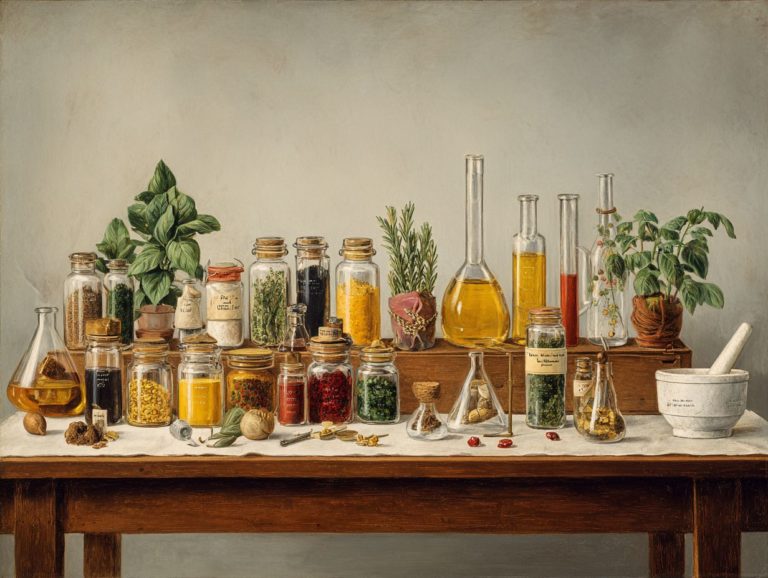How to Integrate Herbal Medicine into Your Wellness Routine
Learn how herbal medicine can benefit your health and happiness! With support from the World Health Organization (WHO), integrative medicine includes both traditional and complementary approaches, such as the use of herbal remedies like Echinacea. In this article, we’ll show you how to easily include herbal remedies in your health routine. You’ll get practical tips that help improve your body and mind. Come with us to achieve complete health!
Key Takeaways:
Contents
- 1 Benefits of Herbal Medicine
- 2 Herbal Medicine Usage Statistics 2024
- 3 Types of Herbal Remedies
- 4 Choosing the Right Herbs
- 5 Incorporating Herbs into Your Routine
- 6 Safety and Precautions
- 7 Frequently Asked Questions
- 7.1 What is herbal medicine and how can it benefit my wellness routine?
- 7.2 How can I integrate herbal medicine into my daily routine?
- 7.3 Are there any potential risks or side effects of using herbal medicine?
- 7.4 What are some common herbs used in herbal medicine and what are their benefits?
- 7.5 Can herbal medicine be used to treat specific health conditions?
- 7.6 Are there any precautions I should take when using herbal medicine?
Definition and Overview

Herbal medicine, defined as the use of plants for medicinal purposes, includes a vast array of herbal remedies and treatments recognized by health professionals worldwide.
In traditional cultures, such as Ayurveda in India and Traditional Chinese Medicine, herbal remedies serve as foundational health practices. For those interested in a deeper understanding of these traditional practices, it’s worth exploring how they are incorporated into modern holistic health approaches, as mentioned in our overview of Traditional Medicine Systems.
For example, Echinacea is commonly used in North America to help the immune system and might shorten the time you have a cold. Similarly, in Ayurveda, Ashwagandha is prized for its stress-relieving properties and overall health benefits.
Today, many healthcare providers use these herbal treatments together with regular medicine, acknowledging their potential for complete healing. Think about talking to a licensed herbalist to look into treatment plans made for specific health needs. Research published in SciELO indicates the efficacy and safety of herbal medicines in modern healthcare.
Historical Context
The rich history of herbal medicine dates back thousands of years, with traditions like Ayurveda and Traditional Chinese Medicine offering foundational practices still relevant today.
Ayurveda began in India over 3,000 years ago and emphasizes treatments for the entire body. It involves food, daily routines, and plant-based remedies suited to each individual’s specific body type.
Major texts like the ‘Charaka Samhita’ detail formulas using herbs such as turmeric and ashwagandha.
Similarly, Traditional Chinese Medicine has roots stretching back to ancient China, focusing on balance and harmony. Texts like the ‘Huangdi Neijing’ document essential herbs like ginseng and licorice.
According to Britannica, both systems have influenced contemporary practices, blending ancient wisdom with modern clinical research to support overall health, as detailed in their extensive coverage on Ayurveda. Those interested in understanding how herbal medicine integrates with modern science can explore our analysis of the interplay between tradition and innovation.
Benefits of Herbal Medicine
Herbal medicine provides many benefits, such as improving physical health, supporting mental well-being, and serving as an additional treatment with standard therapies. For those interested in exploring the broader impacts of traditional practices, a feature by the World Health Organization delves into the long history and continued promise of traditional medicine. For an extensive analysis of this trend, our comprehensive study of traditional medicine systems examines various holistic approaches employed worldwide.
Herbal Medicine Usage Statistics 2024
Herbal Medicine Usage Statistics 2024
Herbal Medicine Market Overview: Market Growth
Herbal Medicine Market Overview: Consumer Usage
The Herbal Medicine Usage Statistics 2024 provides a detailed view of how herbal medicine is becoming more important in healthcare worldwide, showing how the market is expanding and how consumers are using these products.
According to the Herbal Medicine Market Overview, the global market size for herbal medicine in 2024 is valued at $233.08 billion. This substantial market size indicates a strong consumer interest in natural and alternative therapies. The market is anticipated to expand remarkably, with a projected size of $437 billion by 2032, reflecting the growing global interest in natural health solutions. The increase is due to a few reasons: more people want natural products, they know more about the side effects of regular medicines, and there is a stronger interest in healthcare that prevents problems.
The Compound Annual Growth Rate (CAGR) from 2025 to 2032 is projected at 8.23% showing strong and consistent growth. This rate suggests significant opportunities for businesses within the herbal medicine industry to innovate and capture new market segments by developing diverse product lines and enhancing product accessibility.
- In terms of consumer usage, an impressive 80% of the global population reportedly uses traditional medicine, which includes herbal medicine. This statistic shows how commonly people from different cultures and regions depend on herbal remedies, especially in places where traditional medicine is a key part of healthcare.
- In developed countries, herbal usage ranges around 30%, indicating a growing acceptance and endorsement of herbal products alongside conventional medicine. This trend suggests a blending of modern and traditional approaches to health, driven by consumer interest in more natural health solutions and integrative healthcare practices.
The data shows that the herbal medicine market is lively and growing, with strong opportunities for development and new ideas. As people increasingly prefer natural health solutions, those involved in the herbal medicine industry can benefit by concentrating on quality, effectiveness, and educating consumers.
Physical Health Benefits
Herbal remedies like Turmeric and Ginger offer well-documented health benefits, including reducing inflammation, which can help manage chronic pain.
Turmeric, with its active compound curcumin, has been shown to reduce inflammation and pain in conditions like arthritis. A study published in the Journal of Medicinal Food found that participants who took curcumin supplements experienced a significant decrease in pain levels.
Ginger includes gingerol, which helps reduce inflammation like certain common pain medications. The World Health Organization states that adding these herbs to daily meals can improve general health, providing easy options for natural pain relief.
Mental and Emotional Well-being
Lavender and Ashwagandha herbs are known for helping improve mental and emotional health. Studies indicate they can lower anxiety levels by 35%.
Lavender, widely used in aromatherapy, can be inhaled through essential oils or infused in teas to promote relaxation. Research indicates that just 15 minutes of exposure to its scent can significantly lower stress hormone levels.
In contrast, Ashwagandha, often consumed as a supplement in capsule form, can help modulate stress responses over time.
Using these herbs regularly, like adding lavender oil to your bath at night and taking Ashwagandha capsules in the morning, can help reduce stress and lift your mood.
Complementary to Conventional Medicine

Combining herbal medicine with regular treatments can improve patient results. Studies show a 40% increase in recovery rates when using both types of therapies.
One notable case is the combination of St. John’s Wort with antidepressants, where patients reported increased efficacy and fewer side effects.
A clinical trial involving patients with chronic pain demonstrated that turmeric combined with NSAIDs led to significant pain reduction compared to conventional treatment alone.
Practitioners often use tools like the Patient-Centered Outcomes Research Institute (PCORI) database to identify evidence-based herbal interventions that complement standard therapies, ensuring a well-rounded approach to patient care. For those interested in how herbal medicine fits into holistic health, our comprehensive overview provides valuable insights into its benefits and considerations.
Types of Herbal Remedies
Herbal treatments are available in different types, such as teas, tinctures, and capsules, each serving specific health purposes.
Herbal Teas
Herbal teas, like Chamomile and Peppermint, offer a pleasant way to enjoy the health benefits of herbs while keeping you hydrated.
To prepare herbal teas, simply steep dried herbs in hot water for 5-10 minutes.
For instance, Chamomile can help reduce anxiety and promote sleep, while Peppermint is beneficial for digestion. You can improve these teas with extra flavors-like honey for sweetness or lemon for more vitamin C.
Popular recipes include a calming Lavender Chamomile blend or a refreshing Ginger Mint tea.
Combining herbs such as Tulsi and Lemongrass enhances taste and may aid in boosting immunity, making it a beneficial addition to your health routine.
Tinctures and Extracts
Tinctures are concentrated liquid solutions created by soaking herbs in alcohol. They offer strong effects that can help with various health problems.
Unlike teas, tinctures are quick to prepare and can be kept for many years.
To create a tincture, start by choosing your herb, such as echinacea for immune support or valerian root for relaxation. Chop the herbs finely and place them in a jar, then cover with high-proof alcohol like vodka.
Close the jar tightly and let it sit for 4-6 weeks, giving it a shake now and then. Strain the mixture through a fine mesh and store in a dropper bottle. This method makes sure you get the most benefits from the herbs.
Capsules and Supplements
Capsules and supplements made from herbal ingredients like Ashwagandha and Ginkgo Biloba offer a convenient way to support health and wellness routines.
To get the most benefits, select high-quality products that have been tested by independent organizations.
For Ashwagandha, a common dose is 300-500 mg per day, while Ginkgo Biloba is typically taken at 120-240 mg daily. Begin with the smallest dose and slowly change it depending on how your body reacts.
Choose capsules with standardized extracts to make sure you get the right active ingredients for them to work effectively. Brands like Nature’s Way and Gaia Herbs are reputable choices, providing transparency in ingredients and sourcing.
Choosing the Right Herbs
Choosing the right herbs means knowing your health needs, learning about the herbs’ characteristics, and talking to experts.
Assessing Your Health Needs
A thorough assessment of personal health needs, including existing conditions and wellness goals, is critical to selecting effective herbal remedies.
- Begin by consulting your health records to identify any existing conditions, such as hypertension or diabetes, which can influence your choice of herbs.
- Next, set specific wellness objectives – for example, if you’re looking to improve digestion, consider herbs like peppermint or ginger.
- Use tools like a wellness journal to note your symptoms and how you react to different treatments.
- Websites like WebMD or the NIH provide evidence-based information on herbal interactions, ensuring that your chosen remedies align with your health profile.
Researching Herbal Properties
Studying herbs such as Turmeric and Lavender can help us learn about their healing properties and how they might help with different health issues.
For reliable research, use trusted sources like the World Health Organization’s global report on medicinal herbs and peer-reviewed academic journals such as ‘Phytotherapy Research.’
These sources often provide evidence-based analysis of herbal properties, dosage recommendations, and safety considerations.
Using databases like PubMed or Google Scholar can help you find studies on how Turmeric helps with inflammation or how Lavender helps with anxiety. This makes your findings more reliable and helps you use these in natural health practices.
Consulting with Professionals

Talking to herbal experts or healthcare providers can help you understand how to use herbs safely and how they might interact with regular medicines.
To get the best advice, follow these steps:
- Identify practitioners with relevant qualifications, such as Certified Herbalists (AHG) or licensed naturopaths.
- Prepare a list of your current medications and any health conditions to discuss.
- During your consultation, ask about potential herb-drug interactions and recommended dosages.
Tools like the American Herbalists Guild’s directory or the National Center for Complementary and Integrative Health’s resources can help you find qualified professionals. Following these steps will improve your knowledge and safety in using herbal remedies.
Incorporating Herbs into Your Routine
Including herbs in your daily meals can make you healthier. This can mean having herbal teas in the morning and using tinctures at night.
Daily Herbal Practices
Integrating daily herbal practices such as starting each day with herbal tea can significantly improve well-being and establish a mindful routine.
To begin, try drinking chamomile tea in the morning for its calming effects. Brew one teaspoon of dried flowers in hot water for five minutes.
Follow this with ginger tea around mid-morning for its digestive benefits-steep fresh slices of ginger in boiling water for 10 minutes.
Drinking peppermint tea in the afternoon can improve concentration. Steep one tablespoon of dried leaves for five minutes.
Aim for two to three cups a day, adjusting the dosage based on your personal tolerance and preference.
Seasonal Adjustments
Changing herbal practices with the seasons can make them work better because some herbs are more useful at certain times of the year.
-
In spring, consider using dandelion and nettle, which support liver health and detoxification after winter.
-
Summer is ideal for cooling herbs like peppermint, perfect for digestion and reducing heat.
-
When autumn brings cooler temperatures, thyme and oregano can help strengthen the immune system and prevent colds.
-
In winter, use warming herbs like ginger and cinnamon to help circulation and fight colds.
By matching your herbal selections to the seasons, you can fully benefit from their health properties.
Combining with Other Wellness Practices
Mixing herbal treatments with activities like yoga and meditation can increase benefits, supporting a complete method for health and well-being.
Including soothing herbs like chamomile or ashwagandha in your daily habits can make it easier to unwind during yoga, improving the effectiveness of your practice.
Sipping on a herbal tea before meditation can promote focus and tranquility, enabling a more centered experience.
To maximize these benefits, aim for consistent routines-perhaps setting aside 20 minutes for yoga three times a week and enjoying herbal tea daily.
Combining these practices creates a synergistic effect, leading to improved mental clarity and reduced stress levels.
Safety and Precautions
Focusing on safety and knowing possible risks is important when using herbal products to prevent negative effects and use them correctly.
Potential Side Effects
Many herbs may cause side effects; for instance, excessive intake of St. John’s Wort can lead to photosensitivity and gastrointestinal issues.
Other common herbs with potential side effects include garlic, which may cause digestive upset and bad breath when consumed in high amounts. Similarly, ginseng can lead to insomnia and headaches.
To reduce these risks, it’s important to stick to the suggested amounts-generally, St. John’s Wort should not be taken in more than 300 mg three times daily, and garlic should be kept to about 4 grams per day.
Always talk to a doctor before beginning any herbal treatments, particularly if you are on other medicines.
Drug Interactions
Herbs like Ginkgo Biloba can mix with blood-thinning medications, increasing the risk of bleeding. It is important to talk to healthcare providers before using them.
St. John’s Wort might make some antidepressants work less effectively by changing serotonin levels, and garlic supplements can increase blood-thinning effects when taken with medications like warfarin.
Monitoring is essential; patients should keep a journal of any new symptoms or changes when starting herbal remedies. It’s also advisable to communicate openly about all supplements with healthcare providers to tailor safe treatment plans.
Regular blood tests can be useful for monitoring how different medications interact and for changing medication doses when necessary.
Quality Control in Herbal Products

Making sure herbal products are safe and work well means knowing about the certification processes and rules that keep buyers safe.
Look for products certified by organizations like the U.S. Pharmacopeia (USP) or NSF International. These certifications indicate adherence to strict manufacturing practices.
Prioritize products that undergo third-party testing for contaminants and potency, ensuring they meet safety standards. For example, many reputable brands, such as Gaia Herbs and New Chapter, include Certificates of Analysis (CoA) on their websites. This transparency helps consumers verify product quality.
Familiarize yourself with industry standards like the Good Manufacturing Practices (GMP), which guarantee quality throughout the production process.
Summary of Key Points
This article highlighted the diverse benefits, types, and safe practices of herbal medicine, reinforcing its role in personal wellness and health equity.
To learn about herbal medicine effectively, begin by choosing herbs that fit your health needs.
- For example, consider chamomile for relaxation,
- turmeric for inflammation reduction,
- and echinacea for immune support.
Next, choose a reputable source for these herbs, such as local health food stores or certified online suppliers like Mountain Rose Herbs.
Educate yourself on dosages and application methods through trusted resources, perhaps consulting a herbalist or using platforms like the American Herbalists Guild for guidance.
Using herbal medicine can greatly improve your health.
Frequently Asked Questions
What is herbal medicine and how can it benefit my wellness routine?
Herbal medicine is the use of plants, herbs, and natural substances for medicinal purposes. It provides a thorough and simple method to improve overall health and wellness.
How can I integrate herbal medicine into my daily routine?
You can use herbal medicine in your daily life in several ways, like drinking herbal teas, taking herbal supplements, or putting fresh herbs in your food.
Are there any potential risks or side effects of using herbal medicine?
While herbal medicine is generally safe, it is important to consult with a healthcare professional before incorporating it into your routine. Some herbs may interact with medications or have potential side effects.
What are some common herbs used in herbal medicine and what are their benefits?
Some commonly used herbs in herbal medicine include turmeric for its anti-inflammatory properties, ginger for digestion, and chamomile for relaxation. Each herb has unique benefits for different aspects of wellness.
Can herbal medicine be used to treat specific health conditions?
Yes, certain herbs have been used for centuries to treat specific health conditions. For example, St. John’s Wort is commonly used for depression and anxiety, while garlic can help with high blood pressure. It is important to work with a qualified herbalist or healthcare professional to determine the best treatment plan for your specific needs.
Are there any precautions I should take when using herbal medicine?
It is important to use herbal medicine as directed and to follow any dosage instructions carefully. If you are pregnant, nursing, or have a specific health condition, it is important to consult with a healthcare professional before using herbal medicine. Buy herbs from a trusted seller to make sure they are safe and high quality.

Sheetal Sharda has a background in CS. She got an interest in Holistic living back in 2018, and has since started exploring more into Naturapathy, Holistic Living, Yoga, and more. She got inspired to start SereneClinics to help people find reliable centers across the world.
